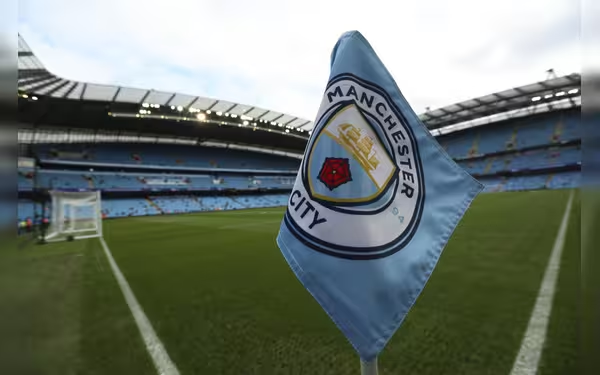Saturday, November 16, 2024 05:38 PM
Manchester City Challenges Premier League Over APT Rules Dispute
- Manchester City disputes Premier League's interpretation of tribunal findings.
- APT rules declared 'unlawful' by arbitration tribunal.
- Legal battle could reshape governance of English football.
 Image Credits: arabnewspk
Image Credits: arabnewspkManchester City disputes Premier League's claims regarding APT rules, raising legal concerns over governance in English football.
Manchester City, one of the most successful football clubs in England, has recently found itself at the center of a legal dispute with the Premier League. This conflict revolves around the rules that govern commercial deals, specifically the Associated Party Transaction (APT) rules. These rules are intended to ensure that any commercial agreements made with entities linked to a club's owners are fair and reflect the true market value. However, Manchester City has raised concerns about the legality and fairness of these regulations.
In a letter sent to the other 19 Premier League clubs and the league itself, Manchester City expressed its dissatisfaction with the Premier League's interpretation of a recent arbitration panel's decision. The club argues that the APT rules are now void, claiming that the Premier League's summary of the tribunal's findings is "misleading" and contains several inaccuracies. City’s general counsel, Simon Cliff, emphasized that the tribunal had declared the APT rules "unlawful," suggesting that the league had abused its dominant position under competition law.
Earlier this year, Manchester City initiated a legal challenge against the APT regulations, asserting that they violated competition laws. The Premier League, on the other hand, claimed victory after the arbitration panel's decision, stating that City was "unsuccessful in the majority of (their) challenge." This conflicting narrative has led to confusion and frustration among the clubs involved.
Cliff pointed out that while Manchester City did not win every point in its legal challenge, it was sufficient for the tribunal to find the APT rules unlawful for just one reason. In fact, the tribunal identified three different reasons for declaring the rules unlawful. This raises questions about the Premier League's assertion of victory and highlights the complexities of the legal battle.
In light of the tribunal's findings, the Premier League is reportedly considering making changes to the APT rules. However, Cliff cautioned against a "kneejerk reaction," warning that hasty decisions could lead to further legal complications. The Premier League has declined to comment on the specifics of the case but maintains that its summary is accurate and not misleading.
This ongoing legal dispute is separate from another significant case involving Manchester City, where the club is contesting 115 charges related to alleged breaches of Premier League financial rules. As the situation unfolds, it remains to be seen how these legal challenges will impact the club's future and the broader landscape of English football.
The clash between Manchester City and the Premier League over the APT rules highlights the intricate relationship between football clubs and regulatory bodies. As both sides prepare for potential changes and further legal battles, the outcome of this dispute could have lasting implications for the governance of football in England. Fans and stakeholders alike will be watching closely, as the resolution of these issues may redefine the rules of engagement in the world of professional football.













